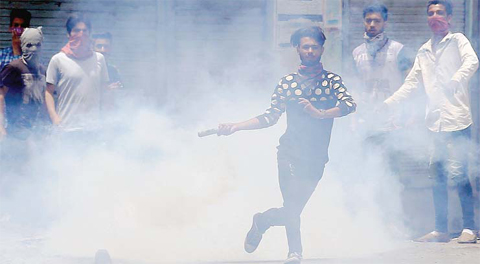SRINAGAR: The death toll in Kashmir rose to 18 yesterday as clashes between Indian troops and protesters continued despite a curfew imposed in the disputed Himalayan region to suppress anti-India anger following the killing of a popular rebel commander.
Anti-India protests have been reported from many places across Kashmir since Burhan Wani, chief of operations of Hizbul Mujahideen, Kashmir's largest rebel group, was killed Friday in fighting with Indian troops.
The dead included 17 civilians killed in two days of clashes between angry, rock-pelting protesters who defied the curfew and Indian troops, a police official said. The other fatality was a policeman who was killed yesterday after protesters pushed the armored vehicle he was driving into a river during clashes in the southern Anantnag area, said the official, who spoke on condition of anonymity because he wasn't authorized to speak to reporters.
After the protests erupted, Indian troops used live ammunition, pellet guns and tear gas to try and control the angry crowds, police said. More than 150 civilians have so far been injured in the clashes.
Police intelligence chief Shiv M. Sahai said that protesters attacked several police and paramilitary posts in the region. Around 90 government troops were also injured, he said. Thousands of government forces in riot gear have fanned out across towns and villages in Kashmir.
Officials at the region's main hospital, in the city of Srinagar, said yesterday that they were dealing with a medical emergency as they tried to attend to at least 80 civilians admitted with bullet and pellet injuries, local media reported.
Coalition of Civil Society, a prominent local rights group, said in a statement yesterday that government forces "assaulted the patients and attendants" at four hospitals in the region and also attacked ambulances carrying patients.
Indian paramilitary spokesman K.K. Sharma said the complaint would be investigated, but called the allegations "baseless." Wani, in his early 20s, had become the iconic face of militancy in Kashmir over the last five years, using social media like Facebook to reach out to young Kashmiri men.
Kashmir is evenly divided between India and Pakistan, but claimed in its entirety by both. Most people in Kashmir have long resented India's presence, and support rebel demands for an independent Kashmir or a merging with Pakistan. More than 68,000 people have been killed in the uprising and the subsequent Indian military crackdown.
Inspector-General Syed Javaid Mujtaba Gillani described Wani's killing as the "biggest success against militants" in recent years. Indian officials, fearing that the killing could lead to violent protests in the already troubled region, have also indefinitely suspended an annual Hindu pilgrimage to a mountain cave that draws about half a million people each year.
Cell phone services in southern parts of Kashmir remained suspended for a second day and mobile internet services were blocked in the rest of the region to prevent anti-India demonstrators from mobilizing. Shops, businesses and government offices remained closed. Authorities also postponed school and college examinations and suspended rail services.-AP



